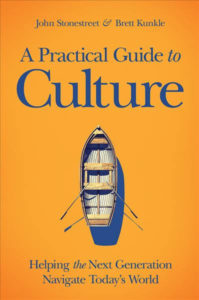In this technological age, standing for Christ among modern cultural trends is growing more difficult, especially with a secular worldview rapidly spreading through television and computer screens that consume more and more of our attention. John Stonestreet and Brett Kunkle’s new book, A Practical Guide to Culture: Helping the Next Generation Navigate Today’s World, provides tools to help parents and young Christians navigate the new cultural wave.
Fighting to encourage Christian parents and their children, Stonestreet and Kunkle assess current culture and offer a guide to young Christ followers as they forge their own path in the secular world. A guide is crucial because, as Stonestreet and Kunkle write, “The kids of today will build the culture of tomorrow.” The ideals presented in Practical Guide to Culture provide pathways towards a Godly culture, helping to lead children as they build the culture of their time, keeping their Christ-centered mindsets and teachings. Working to bring their skillsets together, Stonestreet and Kunkle tackle culture’s commonly unseen undercurrents, extremely powerful forms of pressure exuded by secular philosophy threatening young adults’ faith and Christian lifestyle.
 Practical Guide to Culture addresses how young Christians can tackle the cultural challenges they face head on. These challenges – as highlighted by Stonestreet and Kunkle – include pornography, hookup culture, sexual orientation, gender identity, affluence and consumerism, addiction, entertainment, and racial tension.
Practical Guide to Culture addresses how young Christians can tackle the cultural challenges they face head on. These challenges – as highlighted by Stonestreet and Kunkle – include pornography, hookup culture, sexual orientation, gender identity, affluence and consumerism, addiction, entertainment, and racial tension.
Stonestreet is widely regarded for his authority on education and culture from a Christian worldview, serving as President of the Colson Center for Christian Worldview, as well as being a syndicated author. Kunkle’s experience with children ranging from adolescence to college directly serves him in his role as Student Impact Director at Stand to Reason. Both men are also Christ-driven husbands and fathers.
They begin Practical Guide to Culture by specifying that culture is not instinctual or simply human nature. Rather, culture is what individuals do freely of their own accord. All of culture in and of itself is not bad, but culture is made from both the good and bad in society.
“Culture includes the good, the bad, the morally neutral, and the morally complex,” Stonestreet and Kunkle claim. They stress the importance of being intentional about shaping culture, emphasizing the Bible’s foundational role in dictating the Christian worldview. In doing so, Christians will see culture as the outlet to live a God-centered life that imagines how to serve Him and spread His message.
The Millennial generation, which dictates the modern culture, is faced with an unprecedented dilemma of being committed Christ followers in this increasingly technological age. Stonestreet and Kunkle stress the importance of teaching Millennials to cultivate a culture of Christian understanding, one in which individuals likely have questions about God and their faith, and the importance of making it clear that it’s not wrong to question faith once in a while.
As Practical Guide to Culture acknowledges, the sections of the book addressing pornography, hookup culture, sexual orientation, gender identity, affluence and consumerism, addiction, entertainment, and racial tension could stand on their own without the first two parts of the book. This is why the most powerful parts of the book were the chapters focusing on these practical topics and their relation to Christianity. While offering their interpretations of scripture and suggesting appropriate actions based on God’s word, Stonestreet and Kunkle address anticipated counterarguments. These counterarguments are expressed under headings such as, “Don’t buy the Cultural Lies,” followed by, “Lie #1: Porn is a personal matter, and it’s really no one’s business what people do in their private lives,” along with other rebuttals. Practical Guide to Culture embarks on a thorough explanation on each of these “lies” and provides sound reasoning why those who refute their claims are incorrect, using the Bible and a Christian worldview as evidence.
Raising the next generation with the ability to shape culture into one with a strong biblical foundation will give young Christians the tools necessary to shape their lives, rather than by being shaped by culture.
Those foundations Stonestreet and Kunkle lay dictate how Christians can perceive and shape culture: they can celebrate, create, confront, co-opt, or correct cultural trends and habits. These five foundational options are meant to be effective tools to shape a Christ-influenced culture.
Stonestreet and Kunkle take some hardline stances on issues that don’t have an explicit Biblical mandate. One such example is the supposed necessity of making bedrooms a device-free zone. Practical Guide to Culture defends this by claiming, “It’s madness to allow children unfettered, unfiltered access to the internet in the privacy of their bedrooms. Internet pornography is waiting for them there. Period.” No matter how pure the intentions of protecting children from the dangers of pornography, this recommendation seems to indicate a lack of trust between parents and their children. Without confuting Practical Guide to Culture, Evangelical Christian parents can read this book as a series of suggestions, some of which may be beneficial and some of which might not. Stonestreet and Kunkle concede this point to a degree, and rightly so.
A Practical Guide to Culture is best suited for parents who are looking for just that: a practical guide on how to internalize a Christian worldview to culture.





Comment by Abdul on January 25, 2019 at 9:53 am
A practical culture as a tool to make a living makes a lot of sense, but not religion because religion is not a tool
to make a chair?